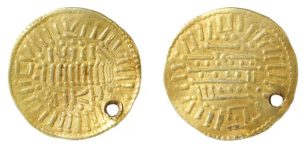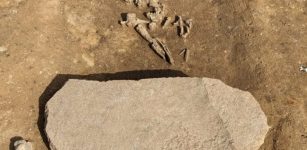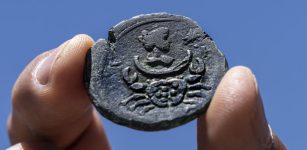Why Is Africa Called Africa?
Conny Waters - AncientPages.com - We read about historical places and events without thinking about what’s behind a name. For example, we can ask - Why is Africa called Africa? How did the African continent get its name?
After Asia, Africa is the world’s second-largest continent. There are 54 countries and territories in Africa, and 11 billion people inhabit them. It’s a beautiful but poor continent that is often forgotten by the western world.
According to historians, there could be several plausible explanations as to why Africa is called Africa.
1644: Willem Janszoon Blaeu. "One of the most decorative and popular of all early maps of Africa, from the 'golden age' of Dutch mapmaking. First issued in 1630, the map was reprinted many times between 1631 and 1667, appearing in Latin, French, German, Dutch, and Spanish editions of Blaeu’s atlases." Credit: Public Domain
The most accepted and widespread theory states that the ancient Romans gave the continent its name after the North African Berber tribe Afri. The Afri lived in caves near the city of Carthage (also called Karthago), corresponding to modern-day Tunisia. During this period, Carthage was inhabited by people who were at war with the ancient Romans. About 146 B.C. Carthage and surrounding areas were destroyed by the Roman Empire and declared a Roman province.
See also: More Ancient History Facts
The Latin word "ca" means "land". Instead of naming the new province Carthage, it was given the name Africa because the Afri tribe was loyal to the leadership in Rome. Therefore, Africa means "the Land of the Afri".
According to another theory, Africa has its origin in the Latin word "aprica", which means "sunny" or the ancient Greek term "aphrike", which stands for "without cold".
Some historians have also suggested a connection between the African continent and the Egyptian word "af-rui-ka", which means "to turn toward the opening of Ka". In Egyptian mythology Ka was the power of the soul, an energetic double of every person. This means "af-rui-ka" can be translated as "the place of birth".
A different theory emerged in the early sixteenth century when famous explorer Leo Africanus who documented everything he saw while visiting many places in North Africa came suggested that the name ‘Africa’ was derived from the Greek word ‘a-phrike’, meaning ‘without cold,’ or ‘without horror’. This is rather logical in fact because “other historians have suggested that the Romans may have derived the name from the Latin word for sunny or hot, namely ‘aprica’. Where exactly the Romans got the name ‘Africa’ from is, however, still in dispute.” 1
Many scientists have suggested that Africa is home to the first humans. If this is true, then the phrase "place of birth" should be considered more seriously, as Africa could be the birthplace of humankind.
Talking about names, do you know why Europe is called Europe?
Written by Conny Waters – AncientPages.com Staff Writer
Updated on July 4, 2021
Copyright © AncientPages.com All rights reserved. This material may not be published, broadcast, rewritten or redistributed in whole or part without the express written permission of AncientPages.com
Expand for references- South African History – Africa _ What’s In A Name?
- Lewis, Martin and Karen E. Wigen - ‘The Architecture of Continents: The Development of the Continental Scheme’, in The Myth of Continents: A Critique of Metageography
More From Ancient Pages
-
 1,800-Year-Old Legio VI Ferrata Military Camp Uncovered In Israel
Archaeology | Feb 21, 2024
1,800-Year-Old Legio VI Ferrata Military Camp Uncovered In Israel
Archaeology | Feb 21, 2024 -
 Peru’s Wari Culture And Their Ancient ‘Amunas’ Will Help Peru’s Water
Ancient Technology | Apr 13, 2015
Peru’s Wari Culture And Their Ancient ‘Amunas’ Will Help Peru’s Water
Ancient Technology | Apr 13, 2015 -
 12,000-Year-Old Ice Age Stone Tools Found – Earliest Dated Evidence For Human Activity in Scotland
Archaeology | Oct 10, 2015
12,000-Year-Old Ice Age Stone Tools Found – Earliest Dated Evidence For Human Activity in Scotland
Archaeology | Oct 10, 2015 -
 Decebalus – The Brave One’ – Last Mighty King Of Dacian People
Featured Stories | Jun 23, 2022
Decebalus – The Brave One’ – Last Mighty King Of Dacian People
Featured Stories | Jun 23, 2022 -
 Underground Man-Made Longyou Grottoes Remain An Ancient Unsolved Mystery
Ancient Technology | Jan 16, 2019
Underground Man-Made Longyou Grottoes Remain An Ancient Unsolved Mystery
Ancient Technology | Jan 16, 2019 -
 On This Day In History: Sverre Sigurdsson Became King Of Norway – On June 29, 1194
News | Jun 29, 2016
On This Day In History: Sverre Sigurdsson Became King Of Norway – On June 29, 1194
News | Jun 29, 2016 -
 On This Day In History: Peasants’ Revolt First Great Popular Uprising In English History – On June 12, 1381
News | Jun 12, 2016
On This Day In History: Peasants’ Revolt First Great Popular Uprising In English History – On June 12, 1381
News | Jun 12, 2016 -
 Archaeologists Examined Ancient Houses To Learn About History Of Inequality
Archaeology | Apr 16, 2025
Archaeologists Examined Ancient Houses To Learn About History Of Inequality
Archaeology | Apr 16, 2025 -
 Bora People Of The Northwest Amazon Use Drums To Speak Over Large Distances
Archaeology | May 4, 2018
Bora People Of The Northwest Amazon Use Drums To Speak Over Large Distances
Archaeology | May 4, 2018 -
 India: Plastic Surgery And Genetic Science – Found In Ancient Vedas – Were Practiced Thousands Of Years Ago
Ancient Technology | Oct 29, 2014
India: Plastic Surgery And Genetic Science – Found In Ancient Vedas – Were Practiced Thousands Of Years Ago
Ancient Technology | Oct 29, 2014 -
 Vikings May Have Made Imitation Gold Dinar Found In Morston, Norfolk – Expert Says
Archaeology | Apr 5, 2023
Vikings May Have Made Imitation Gold Dinar Found In Morston, Norfolk – Expert Says
Archaeology | Apr 5, 2023 -
 Ancient Superhighways: 12,000-Year-Old Massive Underground Tunnels From Scotland To Turkey
Featured Stories | Jul 19, 2015
Ancient Superhighways: 12,000-Year-Old Massive Underground Tunnels From Scotland To Turkey
Featured Stories | Jul 19, 2015 -
 Neolithic ‘Zombie’ Grave Found Near Oppin In Saxony-Anhalt, Germany
Archaeology | Apr 26, 2024
Neolithic ‘Zombie’ Grave Found Near Oppin In Saxony-Anhalt, Germany
Archaeology | Apr 26, 2024 -
 New Trove Of Treasures, Funerary Temple, 50 Sarcophagi Unearthed In Saqqara, Cairo
Archaeology | Jan 18, 2021
New Trove Of Treasures, Funerary Temple, 50 Sarcophagi Unearthed In Saqqara, Cairo
Archaeology | Jan 18, 2021 -
 Previously Unknown Early Christian Church Unearthed In Ancient City Of Artaxata
Archaeology | Oct 18, 2024
Previously Unknown Early Christian Church Unearthed In Ancient City Of Artaxata
Archaeology | Oct 18, 2024 -
 Rare 1,850-Year-Old Bronze Zodiac Coin Discovered During Underwater Survey Off Israel’s Coast
Archaeology | Jul 27, 2022
Rare 1,850-Year-Old Bronze Zodiac Coin Discovered During Underwater Survey Off Israel’s Coast
Archaeology | Jul 27, 2022 -
 Cosquer Cave And Its Magnificent Underwater Stone Age Paintings Created 27,000 Years Ago
Featured Stories | Apr 20, 2021
Cosquer Cave And Its Magnificent Underwater Stone Age Paintings Created 27,000 Years Ago
Featured Stories | Apr 20, 2021 -
 Ancient ‘Refrigerator’ And Unique Coins Discovered In Roman Military Camp In Bulgaria
Archaeology | Oct 3, 2022
Ancient ‘Refrigerator’ And Unique Coins Discovered In Roman Military Camp In Bulgaria
Archaeology | Oct 3, 2022 -
 Experiments Show The Great Sphinx May Be A Natural Formation – Scientists Say
Archaeology | Oct 31, 2023
Experiments Show The Great Sphinx May Be A Natural Formation – Scientists Say
Archaeology | Oct 31, 2023 -
 Glorious And Scary Orava Castle – Realms Of Nosferatu And A Historical Landmark Of Slovakia
Featured Stories | Jan 24, 2020
Glorious And Scary Orava Castle – Realms Of Nosferatu And A Historical Landmark Of Slovakia
Featured Stories | Jan 24, 2020

